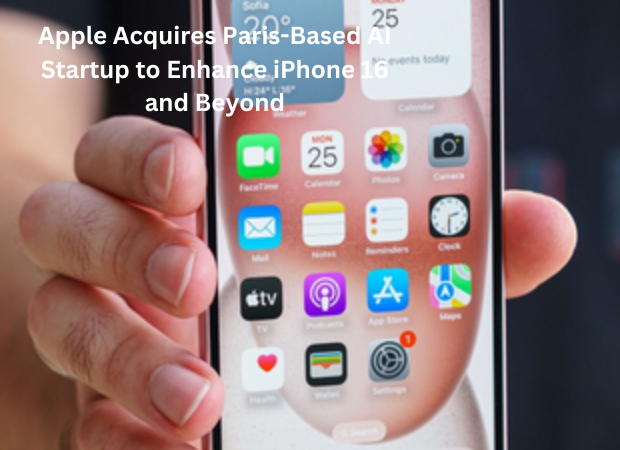Apple’s recent acquisition of the French artificial intelligence (AI) startup, Datakalab, marks a strategic move aimed at bolstering the capabilities of its flagship product line. With plans to integrate Datakalab’s expertise into upcoming iPhone 16 models, Apple is positioning itself to deliver enhanced on-device AI tools. This move underscores Apple’s commitment to leveraging cutting-edge technology to provide users with innovative features and a seamless user experience. As anticipation builds for the release of the iPhone 16, consumers can expect advancements in AI-driven functionalities that cater to their evolving needs and preferences.

Apple Rumored to Introduce On-Device Large Language Model Services with iOS 18
The tech giant is poised to unveil its latest operating system, iOS 18, at the upcoming Worldwide Developers Conference (WWDC) 2024, scheduled to commence on June 10. According to a report by Bloomberg, Apple is expected to provide large language model (LLM) services exclusively through on-device data processing. While the company has yet to officially confirm the introduction of these AI features, speculation is rife that they will debut alongside the launch of iOS 18. This strategic move reflects Apple’s emphasis on privacy and data security, ensuring that sensitive user information remains localized and protected within the confines of their devices. As anticipation mounts for the WWDC event, users eagerly await the unveiling of iOS 18 and the potential integration of advanced on-device AI functionalities.
Apple’s Acquisition of Paris-Based AI Startup: Insights and Implications
Appl’s recent acquisition of the Paris-based AI startup signifies a strategic move toward bolstering its expertise in algorithm compression and embedded AI systems. Despite the acquisition taking place on December 17 of the previous year, neither company has officially commented on the development. However, reports from MacRumors reveal that the acquisition was confirmed through a European Commission filing, as initially spotted by French publications Challenge and iPhoneSoft. This acquisition holds significant implications for Apple’s future product offerings, suggesting potential advancements in on-device AI capabilities and algorithmic efficiencies across its ecosystem. As the tech giant continues to invest in AI innovation, consumers can anticipate enhanced user experiences and cutting-edge features in upcoming Apple products.
Apple’s Acquisition of Datakalab: Aligning AI Innovation with Privacy and Performance
While the financial details of the deal remain undisclosed, this acquisition will undoubtedly play a crucial role in Apple’s integration of AI into its devices.
Established in 2016 by Xavier and Lucas Fischer, Datakalab aimed to introduce Artificial Intelligence technology focusing on low-power, high-efficiency deep learning algorithms capable of functioning without reliance on cloud-based systems.
The company’s emphasis on in-device processing of data not only reduces the risk of data breaches but also ensures faster processing times. This approach aligns perfectly with Apple’s commitment to prioritizing user privacy, data security, and reliable performance. It is this alignment that likely attracted the American tech giant to acquire Datakalab.
Tesla’s Big Surprises: Tiny Y and Tiny 3
Datakalab’s Pre-Acquisition Endeavors: Pioneering AI Solutions for Diverse Applications
Prior to its acquisition by Apple, Datakalab had a track record of engaging in high-profile projects, including collaborations with the French government and Disney.
One notable achievement was the development of technology capable of analyzing human emotions through facial recognition and visual data capture. This innovation found widespread application in capturing real-time audience reactions during film screenings, providing valuable insights for filmmakers and content creators.
Moreover, Datakalab’s specialization in compressing neural networks to operate efficiently on devices such as smartphones and tablets emerged as a key factor driving the acquisition. This expertise positions the company as a valuable asset for Apple as it seeks to further enhance the integration of AI capabilities into its product ecosystem. read more